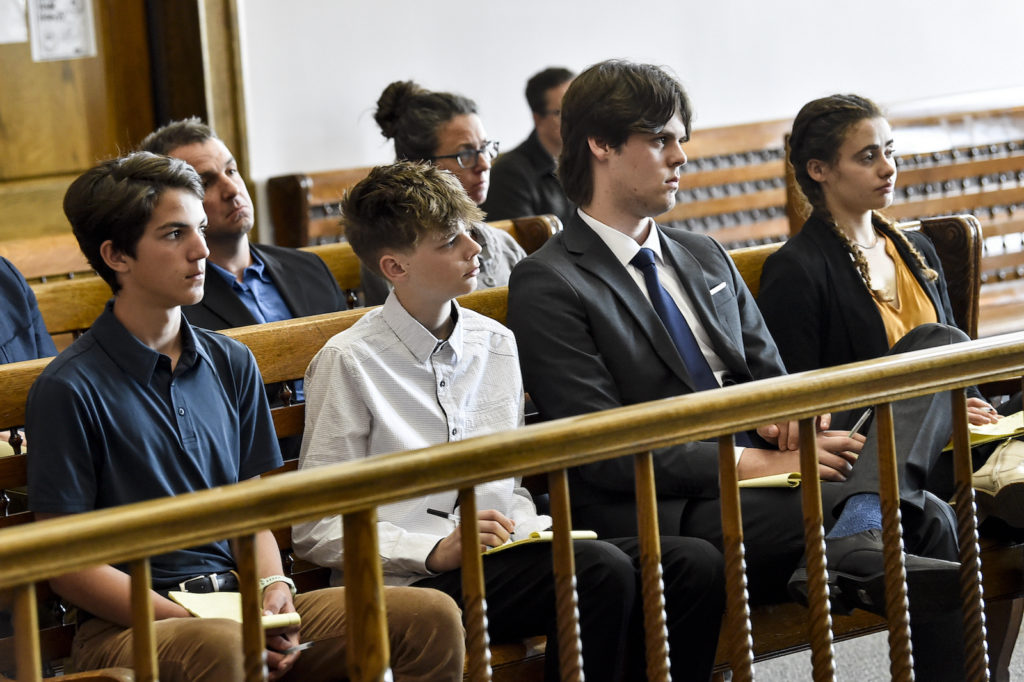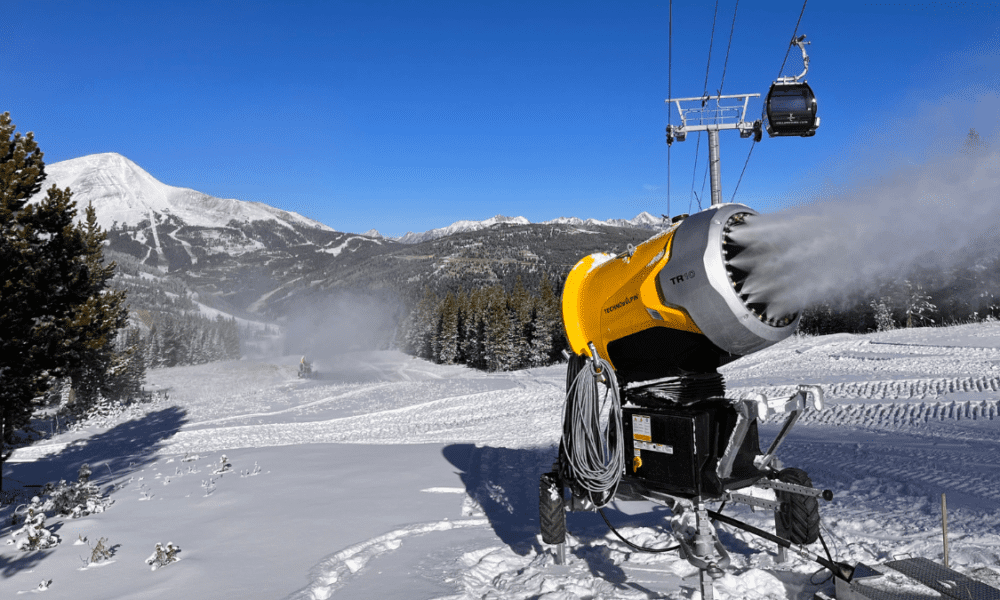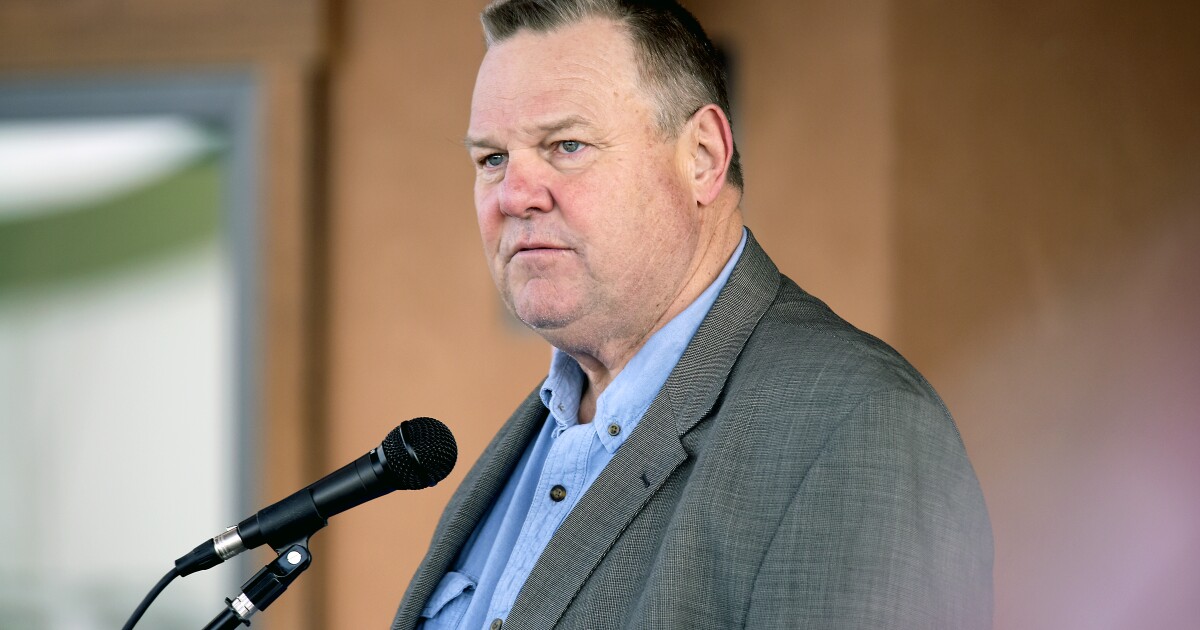Montana
Group of young people sue Montana over inaction on climate change

William Brangham:
So the teenager and some other classmates held fund-raisers, and they raised the money.
Those panels now supply a quarter of the schools’s power, saving the district an estimated $8,000 a year. But Vlases, who’s now going to be a junior in college, has set her sights on an even bigger issue. She and 15 other young people from across Montana, including multiple members of Native American tribes, are suing their state.
They say Montana’s support and permitting of oil, coal and gas projects is polluting the atmosphere, exacerbating climate change, and harming the state’s environment, which, they argue, their state Constitution explicitly prohibits.
Their case, known as Held v. Montana, is the first such state case to ever go to trial.

Montana
Montana Supreme Court hears arguments on permit for Laurel power plant

HELENA — Wednesday in Helena, advocates made their case on whether the state correctly granted NorthWestern Energy a permit for their planned power plant near Laurel.
The Montana Supreme Court met before a full audience Wednesday morning, to hear oral arguments in a case that centers on whether the Montana Department of Environmental Quality did sufficient environmental analysis when approving an air quality permit for the Yellowstone County Generation Station – a 175-megawatt natural-gas-fired plant.
Jonathon Ambarian
Last year, a state district judge in Billings vacated the permit. It came after environmental groups challenged DEQ’s decision, saying the agency hadn’t taken the required “hard look” at issues like the plant’s greenhouse gas emissions and the impact of its lighting and noise on nearby residents.
During Wednesday’s arguments, DEQ and NorthWestern defended the permitting decision and called on the Supreme Court to reverse the district court ruling.
Shannon Heim, NorthWestern’s general counsel and vice president of federal government affairs, said greenhouse gases aren’t regulated the same way as other pollutants, so DEQ didn’t have authority to regulate them. Therefore, she argued the permit can’t be vacated simply because the department didn’t review their impacts.
“The DEQ could not, in the exercise of its lawful authority, deny the permit based on greenhouse gas emissions, because there are no legal standards for greenhouse gas emissions,” she said.
Jonathon Ambarian

Jenny Harbine, an attorney for Earthjustice, represented the plaintiffs – Montana Environmental Information Center and the Sierra Club. She argued DEQ is required to look more broadly at the possible impacts of a project, and that the emissions from the Laurel plant had to be considered in the context of the potential effects of climate change in Montana.
“Plaintiffs here are not criticizing the analysis that DEQ did do,” she said. “Our point is that there’s analysis that DEQ omitted.”
Harbine said plaintiffs are also concerned that, because the district court put a stay on its decision and NorthWestern was able to resume construction, they could begin operations without having had the full review plaintiffs believe is necessary.
Both sides in this case noted that the issues raised here overlap with those in Held v. Montana, the prominent climate change lawsuit that is also now before the Montana Supreme Court. In Held, a state district judge ruled that a law preventing regulators from considering greenhouse gas emissions in environmental reviews was unconstitutional. The 2023 Montana Legislature passed that law in response to the judge’s decision that vacated the permit for the Laurel plant.
Jonathon Ambarian

Jeremiah Langston, an attorney for DEQ, said the department had been planning to update its review in light of that law when it was blocked. He encouraged the Supreme Court to make its decision in Held and this case at the same time or somehow tie them together.
“It would be immensely helpful to DEQ to know what laws apply to its MEPA analysis for a project,” he said.
Harbine said Held gave an example of the broad impacts of the state’s policies on climate reviews, and this case provided a specific example.
“I would just urge that whether the issue is resolved in this case or in Held – or in both, which we think is most appropriate – that it be done in a manner that prevents the constitutional infringement that would be caused when that plant begins operating and emitting greenhouse gas emissions before those emissions have been studied by DEQ,” she said.
The Supreme Court generally takes no immediate action after an oral argument, and that was again the case Wednesday.
Jonathon Ambarian
After the hearing, the conservation group Northern Plains Resource Council held a rally at the State Capitol, saying the possible impacts of the Laurel plant’s emissions need to be taken into account.
Those in attendance chanted “Clean and healthful; it’s our right!” – referring to the Montana Constitution’s guarantee of a “clean and healthful environment.”
Mary Fitzpatrick, a Northern Plains member, said people in Laurel and downwind of the plant in Billings have concerns about the potential health effects. MTN asked her what she thought would have changed if DEQ had taken a closer look at the plant’s greenhouse gas emissions.
“It’s hard to say – you know, just listening to the arguments, I got the impression that, possibly, nothing – except that we would know,” she said. “You can’t manage or change what you don’t measure.”
John Hines, NorthWestern’s vice president of supply and Montana government affairs, said the company sees the capacity of the Yellowstone County Generating Station as critical to make sure they can keep serving customers when other resources aren’t available. He said solar and wind production tends to be more unreliable during extreme weather, and that the company will be forced to pay more to purchase power on the open market if it doesn’t have a on-demand generation facility like this.
“The bottom line is we have to have enough electrons and enough gas on our system to meet our customers’ needs when it’s critical weather – and, you know, we saw that in January when it was -45,” he said. “That’s our first obligation. And none of the groups who are throwing out alternative proposals have that responsibility.”
Hines said, if YCGS had been in operation during the January cold snap, it could have saved customers about $12 million over six days. He said renewables are a significant part of NorthWestern’s portfolio, and that it’s unfair for opponents to accuse the company of building the plant for profit because they could make more profit by building the same capacity in renewable projects.
Hines said YCGS could be fully operational within the next month and a half. He said NorthWestern has taken steps to address some of the concerns neighbors have raised about lighting and noise.
“We’ve been operating Yellowstone now in a test mode for quite some time, and local people have been asking us when are we going to start the engines,” he said. “So obviously the noise issue has been abated.”
Montana
Second Montana ski resort looks to turn wastewater into powder

The Spanish Peaks Mountain Club has requested a permit from the Montana DEQ.
By Justin Franz MONTANA FREE PRESS
The Spanish Peaks Mountain Club in Big Sky has asked for a permit from the Montana Department of Environmental Quality to let it turn wastewater into snow for skiing and snowboarding. The private club is the second Montana ski area to try and implement snowmaking technology that proponents say is good for the environment and skiers amid a warming climate.
More than a dozen ski areas in eight states, plus some in Canada, Switzerland and Australia, use wastewater to make powder. This past winter, the Yellowstone Club near Big Sky became the first in Montana to turn what was once sewage into snow. The Spanish Peaks Mountain Club and Yellowstone Club share a common parent company, CrossHarbor Capital Partners, but they operate as separate businesses. The Spanish Peaks terrain is operated by Big Sky Resort and accessible to the public.
If approved, Spanish Peaks Mountain Club would use the treated water to make snow on approximately 44.5 acres of groomed runs on Spirit Mountain and the Spanish Creek base area and about 40.7 acres in the Southern Comfort ski area. The ski area would mostly use the treated snow in November and December to build a base during the early season.
The project would be built out in two phases. During phase one, the ski area would use 23 million gallons of treated water per year to make about 18 to 24 inches of snow. During phase two, that would increase to 44 million gallons of water annually.
DEQ has prepared a draft environmental assessment and is accepting comments on the plan through June 6.
In an emailed statement to Montana Free Press, Spanish Peaks’ Vice President of Environmental Operations Richard Chandler wrote, “We are very excited about this effort and appreciate the Department of Environmental Quality’s careful review. The conservation community in Montana has embraced the concept of turning reclaimed water into base layer snow to reuse our precious resources, recharge the aquifer and extend cold water flow into our rivers in the late summer months. Projects like these will help add resiliency to the Gallatin River, especially during drought years.”
Chandler, who also oversees the Yellowstone Club’s environmental operations, has previously said that turning recycled water into snow is better for the environment than just releasing it into a river, which normally is what happens. By shooting it through the snowmaking equipment (it’s essentially misted onto the slopes as snow) the wastewater is treated again. Then, as it melts in the spring and enters the ground, it’s filtered a third time. Because of that, groups like the Gallatin River Task Force, Trout Unlimited, American Rivers, Great Yellowstone Coalition and the Association of Gallatin Agricultural Irrigators all supported the Yellowstone Club project.
The effort to turn wastewater into snow in Big Sky dates back more than a decade. In 2011, the Gallatin River Task Force, Yellowstone Club and DEQ teamed up to study the concept. The idea was that as climate change made the region’s snowpack more unpredictable, they could serve skiers and the watershed by making snow from treated water that is traditionally just put into rivers and other bodies of water. That winter they successfully turned a half-million gallons of wastewater into two acres of snow about 18 inches deep.
In 2020, the Yellowstone Club applied for a permit from DEQ to expand that pilot program into a permanent snowmaking operation on Eglise Mountain. The following year, the state issued a permit allowing the Yellowstone Club to turn 25 million gallons of wastewater into snow annually. Two years and $12 million later, the new system began making snow last November.
Under the current plan, 80% of the recycled water comes from the Big Sky community, and 20% comes from the Yellowstone Club. For the Spanish Peaks project, all of the water will come from the Big Sky County Water and Sewer District wastewater treatment facility.
Montana
Q&A: Jon Tester, Democratic Candidate for U.S. Senate

We are gathering information from all statewide candidates as a resource for the 2024 Primary Elections. Responses were limited to 200 words per question. Political attacks may have been removed, but otherwise, the responses are published unedited.
What is your full name as it will appear on ballots?
Jon Tester
What is your age?
67
Where do you live?
Big Sandy, MT
What is your education background?
College of Great Falls, Bachelor of Science in Music
Please list your current and previous occupations.
U.S. Senator, dirt farmer, music teacher for Big Sandy public schools
What motivated you to seek a seat in the U.S Senate?
Simply put, the Montana we know and love is changing. Everything from housing to groceries is more expensive as out-of-state multimillionaires move here and buy up our land, using Montana as their personal playground.
It’s putting a strain on everything – on prices, on our local infrastructure, on our towns and our parks and our public lands. With so much changing, we’ve got to have somebody in the Senate who’s willing to fight for our Montana way of life.
I still farm the land just outside of Big Sandy that my grandparents homesteaded more than 100 years ago. I feel those changes that are going on in Montana right now, every day.
Montana needs somebody back in Washington, DC who understands rural America. Someone who fights for our freedoms and goes to bat for our veterans, our family farms and ranches, our working families, our health care workers and our teachers. I’m running to keep up the fight for those folks, and to make sure our kids and grandkids can grow up in the same Montana we know and love. Montana is the greatest state in the greatest country in the world and it’s damn sure not for sale.
What, if anything, should the Senate do to address the federal deficit?
The deficit is out of control and both parties are to blame. In Montana, we know how to balance a budget and live within our means. That is why I authored a balanced budget proposal. It would protect Social Security and Medicare benefits that our seniors have earned while still forcing the federal government to stop racking up the debt and passing it along to our kids and grandkids. We also need to hold massive corporations accountable and make them pay their fair share.
Yes or no, do you support a federal ban on abortion?
NO.
Montanans of all stripes don’t want the federal government telling them what to do, and they don’t want politicians or judges stripping away their personal freedoms. Just last year, politicians in Montana ignored the voices of the voters and passed abortion bans. I opposed these bans and will always fight to protect Montana women’s freedom to make their own health care decisions.
What, if anything, should the Senate do to address climate change?
There is no question about it, climate change is impacting our economy and our way of life. Sharla and I see these impacts firsthand on our farm, where significant droughts have led to some of the toughest harvests in recent years. Wildfire seasons burn longer and more intensely, and taxpayers are stuck with the bill, paying untold billions of dollars to rebuild after extreme weather events.
We should be developing clean energy technologies to tackle climate change, create good-paying American jobs, and secure our energy independence, and Montana has the opportunity to lead the way. China is actively working to beat America in the clean energy sector in hope of taking over as the world’s strongest economy. We can’t afford to lose this competition. That’s why we should invest directly in Montana companies researching next-generation energy technologies that are affordable and lower costs for consumers. And my Bipartisan Infrastructure Bill secured investments to update our energy grids to prevent and protect against wildfire. Traditional energy sources like oil and gas remain a critical part of how we power our country, so we need to continue to invest in development of technologies like carbon capture and storage to reduce carbon emissions.
What changes, if any, should be made to the way elections and campaigns are funded?
Elected leaders should work for the people, not those who can cut the biggest check. It’s way past time to kick dark money out of politics. We should have done it yesterday.
The Supreme Court’s Citizens United v. FEC decision was disastrous. It flooded our elections with mind-boggling amounts of money and made a mess of our democracy. Since then, I’ve fought to overturn that decision with my “Corporations Are Not People” constitutional amendment, and I urge my colleagues in the Senate to join me in making sure hardworking Montanans, not massive corporations and out-of-state billionaires, get to pick their elected officials.
I will also continue fighting for better transparency in campaign finance, like my Sunlight for Unaccountable Non-profits (SUN) Act, which would take huge strides towards eliminating dark money by requiring the IRS to publicly disclose donors who give over $5,000 to certain tax-exempt groups engaging in political activity.
Hardworking Montanans should be the ones deciding their elections, not out-of-state special interest groups. I will always defend the voices of Montanans and put them first.
What, if anything, should the Senate do to improve the nation’s immigration laws and security at the southern border?
What’s happening on the southern border is unacceptable, and dedicating more manpower and resources is crucial to keeping Montanans safe.
That’s why I’ve called on President Biden to step up and do everything in his power to secure the border, and it’s why I supported a strong bipartisan deal to get our border under control earlier this year. This bipartisan bill would have hired more border patrol agents, cracked down on the fentanyl crisis, and tightened asylum standards – that’s why it received the strong endorsement of the National Border Patrol Council. Unfortunately, many of my colleagues decided to play politics and voted to keep the border open for another year so they could campaign on the issue.
I have been talking with Montanans, sheriffs, and mayors across the state, they all are feeling the consequences of the situation at the southern border, from stretched law enforcement budgets to fentanyl in the communities. I was proud that my bipartisan FEND Off Fentanyl Act passed to place sanctions on countries engaged in international trafficking of illegal fentanyl and give law enforcement the resources they need to battle the fentanyl crisis.
What, if anything, should the Senate do to ensure Social Security and Medicare benefits meet the needs of older adults?
I will never cut Social Security and Medicare. Full stop. For many older Montanans, Social Security is their only source of retirement income, and Medicare is their only way to access affordable life-saving health care. These are essential benefits that Montanans have spent their entire lives paying into, and I will always fight to ensure these benefits are protected – not just for today’s seniors but for all of Montana’s future generations.
There are some politicians who want to end Social Security or cut those benefits. I oppose any plan to do so. I will also stand tough against any plan to privatize Medicare, because our seniors have paid into that their whole lives and should be able to rely on it. I was also proud to pass legislation that allowed Medicare to negotiate prescription drug prices – including capping the price of insulin for seniors at $35/month – and I will fight to ensure that Montana’s nursing homes stay open and fully-staffed. Montana’s seniors can count on me to defend their hard-earned health care benefits.
What should be the top priority when managing public land?
As a lifelong Montanan, I know our public lands are foundational to our way of life and to our state’s economy. You don’t need to be a millionaire to hunt, fish, or hike in these treasured landscapes, because they belong to all of us. Our public lands play a key role for ranchers looking to graze their cattle, or local sawmills in need of timber to harvest. That is why I oppose the call from some politicians who have said they want to transfer our public lands, which would make it easier to sell our wide open spaces off to the highest bidder.
Montana has a long history of local collaboratives working together to improve management of our public lands. I worked with Montanans to protect special places like the Rocky Mountain Front, Glacier National Park, and the Gateway to Yellowstone National Park. I am also incredibly proud to have secured full funding for the Land and Water Conservation Fund, and it’s because of that work that conservation and recreation priorities for Montana’s public lands will be funded for generations to come. And I will continue to fight for bills like the Blackfoot Clearwater Stewardship Act to protect thousands of acres of public lands for future generations.
What, if anything, would you do if elected to build trust in the Senate?
When I first ran for U.S. Senate, I made a promise to Montanans that I would go above and beyond on ethics and transparency and work for them – not special interest groups.
Every day since, I’ve worked tirelessly to uphold that promise. The first thing I did was post my Senate schedule online for all Montanans to see. I was the first Senator to do this and still do it to this day – unfortunately, I’m one of the only U.S. senators who does. So I’ve introduced a bill to make that mandatory for all of my colleagues, because the American people deserve to know who their elected officials are meeting with.
I’m also fighting to crack down on lobbyist influence. I’m working to shut the revolving door by banning members of Congress from becoming lobbyists – ever. And I routinely invite retired Montana judges to conduct a voluntary ethics audits of my office, to ensure my office and I meet the high standards we set for ourselves. I think all of my colleagues should join me.
Like most Montanans, I believe a handshake means something and our word is our bond. That’s how trust in the Senate should be built – by earning it.
-

 News1 week ago
News1 week agoCompass Direct LLC’s 2024 Registration in North Carolina
-

 World1 week ago
World1 week agoTech compliance reports, Newsletter
-

 News1 week ago
News1 week agoMan, 75, confesses to killing wife in hospital because he couldn’t afford her care, court documents say
-

 News1 week ago
News1 week agoColumbia University cancels its main commencement ceremony after weeks of turmoil
-

 World1 week ago
World1 week agoPentagon chief confirms US pause on weapons shipment to Israel
-

 World1 week ago
World1 week agoConvicted MEP's expense claims must be published: EU court
-

 Politics1 week ago
Politics1 week agoRFK Jr said a worm ate part of his brain and died in his head
-

 Politics1 week ago
Politics1 week agoPresidential polls show deadlocked race as party conventions quickly approach















